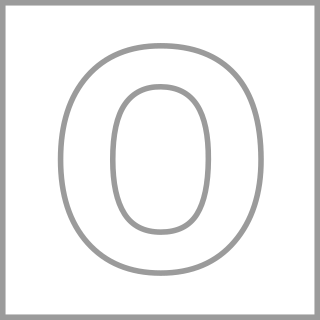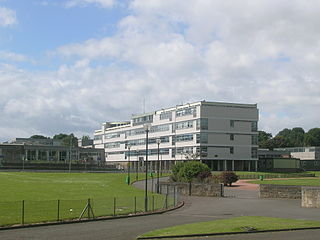
The General Certificate of Secondary Education (GCSE) is an academic qualification in a particular subject, taken in England, Wales, and Northern Ireland. State schools in Scotland use the Scottish Qualifications Certificate instead. Private schools in Scotland may choose to use GCSEs from England.
The General Certificate of Education (GCE) is a subject-specific family of academic qualifications used in awarding bodies in England, Wales, Northern Ireland, Crown dependencies and a few Commonwealth countries. For some time, the Scottish education system has been different from those in the other countries of the United Kingdom.

The Scottish Qualifications Authority is the executive non-departmental public body of the Scottish Government responsible for accrediting educational awards. It is partly funded by the Education and Lifelong Learning Directorate of the Scottish Government, and employs approximately 750 staff based in Glasgow and Dalkeith.
Standard Grades were Scotland's educational qualifications for students aged around 14 to 16 years. Introduced in 1986, the Grades were replaced in 2013 with the Scottish Qualifications Authority's National exams in a major shake-up of Scotland's education system as part of the Scottish Credit and Qualifications Framework overhaul.
In the Scottish secondary education system, the Higher is one of the national school-leaving certificate exams and university entrance qualifications of the Scottish Qualifications Certificate (SQC) offered by the Scottish Qualifications Authority. It superseded the old Higher Grade on the Scottish Certificate of Education (SCE). Both are normally referred to simply as "Highers".

A sixth form college is an educational institution, where students aged 16 to 19 typically study for advanced school-level qualifications, such as A Levels, Business and Technology Education Council (BTEC) and the International Baccalaureate Diploma, or school-level qualifications such as General Certificate of Secondary Education (GCSE) examinations. In Singapore and India, this is known as a junior college. The municipal government of the city of Paris uses the phrase 'sixth form college' as the English name for a lycée (Highschool).
The National Certificate of Educational Achievement (NCEA) is the official secondary-school qualification in New Zealand. Phased in between 2002 and 2004, it replaced three older secondary-school qualifications. The New Zealand Qualifications Authority administers NCEA.
The Certificate of Secondary Education (CSE) was a subject-specific qualification family awarded in both academic and vocational fields in England, Wales and Northern Ireland. CSE examinations were held in the years 1965 to 1987. This qualification should not be confused with the Indian Certificate of Secondary Education which is the school leaving qualification in India. Also, in some African and former British colonial countries there is a qualification named the Certificate of Secondary Education based on the original and former British variant. Also, the CSE should not be confused with the African qualification CSEE.
The Advanced Higher is an optional qualification which forms part of the Scottish secondary education system brought in to replace the Certificate of Sixth Year Studies (CSYS). The first certification of Advanced Higher was in 2001. It is normally taken by students aged around 16–18 years of age after they have completed Highers, which are the main university entrance qualification in Scotland.
The Ordinary Grade of the Scottish Certificate of Education is a now-discontinued qualification which was studied for as part of the Scottish secondary education system. It could be considered broadly equivalent to the old English O-Level qualification and is the predecessor to the Standard Grade.
The Scottish Certificate of Education was a Scottish secondary education certificate, used in schools and sixth form institutions, from 1962 until 1999. It replaced the older Junior Secondary Certificate (JSC) and the Scottish Leaving Certificate (SLC), and it was the Scottish equivalent of the General Certificate of Education, used in England, Wales and Northern Ireland. One primary distinction between the Scottish Leaving Certificate and the Scottish Certificate of Education was that the latter had less strict regulations in terms of compulsory subjects and workload of the individual curricula.
This is an article about the grading used below degree level in most of the United Kingdom. The entire United Kingdom does not use the same grading scheme. For a degree level, see British undergraduate degree classification.

The A-Level is a subject-based qualification conferred as part of the General Certificate of Education, as well as a school leaving qualification offered by the educational bodies in the United Kingdom and the educational authorities of British Crown dependencies to students completing secondary or pre-university education. They were introduced in England and Wales in 1951 to replace the Higher School Certificate. The A-level permits students to have potential access to university if their grade is of satisfactory quality.

The O-Level is a subject-based qualification conferred as part of the General Certificate of Education. It began in the United Kingdom and has been adopted, often with modifications, in several other countries.
National Qualifications (NQs) are qualifications studied in secondary schools and colleges of further education in Scotland. There used to be three types of National Qualification - Standard Grades, National Courses and National Units. For the most up-to-date information about Scottish qualifications, please visit the pages of the Scottish Qualification Authority.
In the UK education sector, there are a wide range of qualification types offered by the United Kingdom awarding bodies. Qualifications range in size and type, can be academic, vocational or skills-related, and are grouped together into different levels of difficulty. In England, Wales and Northern Ireland, qualifications are divided into Higher Education qualifications, which are on the Framework for Higher Education Qualifications (FHEQ) and are awarded by bodies with degree awarding powers, and Regulated qualifications, which are on the Regulated Qualifications Framework (RQF) and are accredited by Ofqual in England, the Council for the Curriculum, Examinations and Assessment in Northern Ireland and Qualifications Wales in Wales. In Scotland, qualifications are divided into Higher Education qualifications, Scottish Qualifications Authority qualifications and Scottish Vocational Qualifications/Modern Apprenticeships, which are on the Scottish Credit and Qualifications Framework (SCQF). Scottish Higher Education Qualifications are on both the SCQF and the FHEQ.
The General Certificate of Education (GCE) Advanced Level, or A Level, is a main school leaving qualification in England, Wales, Northern Ireland, the Channel Islands and the Isle of Man. It is available as an alternative qualification in other countries.
The New Zealand School Certificate or School Certificate was an examination-based New Zealand secondary-school qualification for high-school students in Year 11 from the 1940s until 2002.

Secondary education in Scotland can take up to 6 years, covering ages 11 to 18, from S1 to S6. Education is not compulsory after the age of 16, the age of majority in Scots law.

The General Certificate of Education (GCE) Ordinary Level, also called the O-level or O level, was a subject-based academic qualification. Introduced in 1951 as a replacement for the 16+ School Certificate (SC), the O-level would act as a pathway to the new, more in-depth and academically rigorous A-level, in England, Wales and Northern Ireland. Later, the complementary and more vocational Certificate of Secondary Education (CSE) was added to broaden the subjects available and offer qualifications in non-academic subjects.





